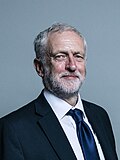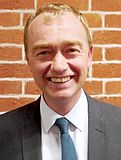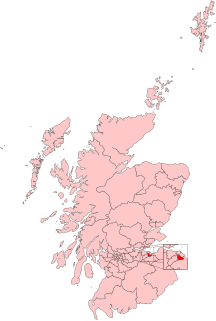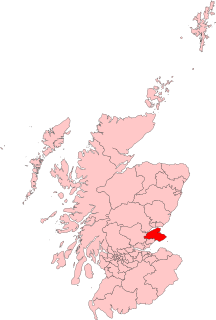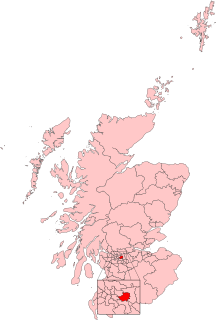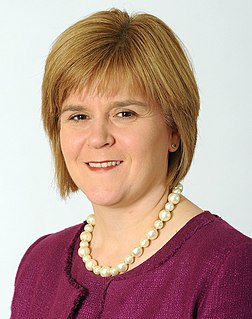| |||||||||||||||||||||||||||||||||||||||||||||||||||||||||||||||||||||||
All 59 Scottish seats to the House of Commons | |||||||||||||||||||||||||||||||||||||||||||||||||||||||||||||||||||||||
|---|---|---|---|---|---|---|---|---|---|---|---|---|---|---|---|---|---|---|---|---|---|---|---|---|---|---|---|---|---|---|---|---|---|---|---|---|---|---|---|---|---|---|---|---|---|---|---|---|---|---|---|---|---|---|---|---|---|---|---|---|---|---|---|---|---|---|---|---|---|---|---|
| Turnout | 66.4%, | ||||||||||||||||||||||||||||||||||||||||||||||||||||||||||||||||||||||
| |||||||||||||||||||||||||||||||||||||||||||||||||||||||||||||||||||||||
 Colours on map indicate winning party for each constituency | |||||||||||||||||||||||||||||||||||||||||||||||||||||||||||||||||||||||
The 2017 United Kingdom general election in Scotland was held on Thursday, 8 June 2017 and all 59 seats were contested under the first-past-the-post electoral system.

A first-past-the-post electoral system is one in which voters indicate on a ballot the candidate of their choice, and the candidate who receives the most votes wins. This is sometimes described as winner takes all. First-past-the-post voting is a plurality voting method. FPTP is a common, but not universal, feature of electoral systems with single-member electoral divisions, and is practiced in close to one third of countries. Notable examples include Canada, India, the United Kingdom, and the United States, as well as most of their current or former colonies and protectorates.
Contents
- Political context
- Campaign events
- Opinion polling
- Results
- Votes summary
- List of Constituencies by Party
- Description of results
- Target seats
- Scottish Conservative Party
- Labour Party
- Scottish Liberal Democrats
- Scottish National Party
- References
The general election in Scotland was fought in the aftermath of the 2016 Scottish Parliament election in which the SNP won a third term in government but lost their overall majority in the Scottish Parliament. At that election, the Scottish Conservative Party increased their number of MSPs, overtaking Labour as the largest opposition party. The 2016 EU referendum was held a month later on Thursday, 23 June and the final result was for the United Kingdom to Leave the EU; despite Scotland voting 62.0% Remain. Negotiations are due to begin shortly since invocation of Article 50 of the Treaty on European Union in March 2017, which was expected to dominate the snap general election campaign. [1]

Scotland is a country that is part of the United Kingdom. Sharing a border with England to the southeast, Scotland is otherwise surrounded by the Atlantic Ocean to the north and west, by the North Sea to the northeast and by the Irish Sea to the south. In addition to the mainland, situated on the northern third of the island of Great Britain, Scotland has over 790 islands, including the Northern Isles and the Hebrides.
In line with the Fixed-term Parliaments Act 2011, an election had not been due until 7 May 2020, but a call for a snap election by Prime Minister Theresa May received the necessary two-thirds majority in a 522-13 vote in the House of Commons on 19 April 2017. [2] The Conservative Party, which has governed since 2010, was defending a majority of 17 [3] against the Labour Party, the official opposition. The third-largest party was the Scottish National Party (SNP), which won 56 of the 59 Scottish seats at the 2015 general election.

The Fixed-term Parliaments Act 2011 is an Act of the Parliament of the United Kingdom that received Royal Assent on 15 September 2011, introducing fixed-term elections to the Westminster parliament for the first time. Under the provisions of the Act, parliamentary general elections must be held every five years, beginning in 2015.
A snap election is an election called earlier than expected.

The Prime Minister of the United Kingdom is the head of government of the United Kingdom. The Prime Minister directs both the executive and the legislature, and together with their Cabinet are collectively accountable for their policies and actions to the Monarch, to Parliament, to their political party and ultimately to the electorate. The office of Prime Minister is one of the Great Offices of State. The current holder of the office, Theresa May, leader of the Conservative Party, was appointed by the Queen on 13 July 2016.
The election resulted in the SNP remaining as the largest single party in Scotland despite losing 21 seats to pro-union candidates. The Conservatives doubled their share of vote and won 13 seats while Labour won 7 seats and the Liberal Democrats won 4 seats respectively. The Conservatives recorded their best result in Scotland since 1983 or (in terms of seats won) 1979 (in terms of share of the popular vote). Until this election, the Conservatives had not been the second-largest party in Scotland since 1992 and had not been the largest unionist party in Scotland since 1955.
Defeated SNP MPs included: former SNP leader and First Minister of Scotland Alex Salmond, [4] SNP Westminster leader Angus Robertson, [5] SNP Chief Whip Mike Weir; [6] as well as John Nicolson [7] and Tasmina Ahmed-Sheikh. [8] Commentators suggested that the election might reduce the SNP's case for a second referendum on Scottish independence. [9] [10] [11] Following the election, the SNP leader Nicola Sturgeon acknowledged that her party's plans for a second referendum were 'undoubtedly' a factor in the election results. The SNP also abandoned its fundraiser for a possible referendum after raising half of its £1,000,000 target, just over a week before its preset deadline. [12]

The First Minister of Scotland is the leader of the Scottish Government. The First Minister chairs the Scottish Cabinet and is primarily responsible for the formulation, development and presentation of Scottish Government policy. Additional functions of the First Minister include promoting and representing Scotland in an official capacity, at home and abroad, and responsibility for constitutional affairs, as they relate to devolution and the Scottish Government.
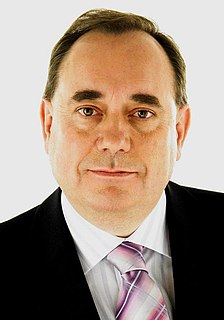
Alexander Elliot Anderson Salmond is a Scottish politician who served as the First Minister of Scotland from 2007 to 2014. He was the leader of the Scottish National Party (SNP) for over twenty years, having served for two terms, firstly from 1990 to 2000 and subsequently from 2004 to 2014. He was the Member of Parliament (MP) for Banff and Buchan between 1987 and 2010, when he stood down to focus on his other roles, and then for Gordon from 2015 to 2017, when he lost his seat to Scottish Conservative candidate Colin Clark. During the 2015–2017 parliament, he was the SNP International Affairs and Europe spokesperson in the House of Commons.

Angus Struan Carolus Robertson is a former Scottish politician who was the Depute Leader of the Scottish National Party (SNP) and was the party's spokesperson on the Constitution in the House of Commons of the United Kingdom. He was first elected to the House of Commons in 2001. In 2017, he sought re-election as the MP for Moray and lost to Scottish Conservative candidate Douglas Ross.


